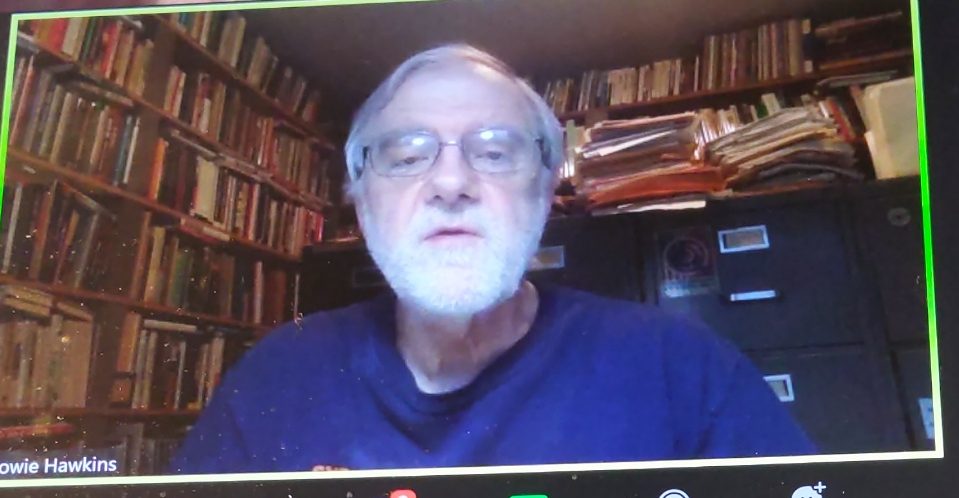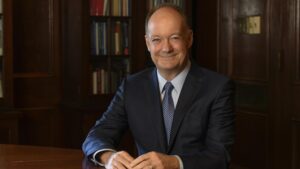It’s not often the Voice gets to sit down with a presidential candidate.
In fact, Howie Hawkins, long time Green Party candidate for governor of New York and, more recently, member of the US Postal Service, was the first. Well, the first we virtually sat down with, that is.
Hawkins, clad in a blue sweater, in front of a cozy, book-laden background joined the Voice to discuss how young people can make change, his platform, and where the Green Party fits in national politics.
***
According to Hawkins, college students have “more power than they know” when it comes to fighting for a better society.
“The study of history will show when you think it’s hopeless, you actually may be winning. In the back of people’s minds you’re winning them over, and they won’t even admit it to you,” he said. “Look at how movements develop, and you will realize you don’t win at first, but you win in the end.”
Hawkins knows a lot about how movements develop. His career in activism began in the Bay Area in the 1960s. There, he was a part of civil rights and anti-war demonstrations. It was during this time Hawkins became focused on the need for a third political party, one which he hoped would understand the issues of the day more than Republicans and Democrats. This thought process culminated in the Green Party, which Hawkins has been involved in since its inception. At the first National Green Gathering in 1987, Hawkins helped chart the party’s way forward.
“My message at that first Green Party meeting was that we can’t build this out of a presidential campaign,” Hawkins said. “We got to build it from the bottom up, organize local groups, get involved in local politics, build a base.”
The Green Party succeeded on that smaller scale for several years before rising to national prominence with the campaigns of Ralph Nader for president in 1996 and 2000. While Nader did not run an active campaign, his name allowed the Green Party to receive a national profile, especially as Democrats blamed his voters for Al Gore’s loss in 2000.
That recognition has continued today, with Green Party candidates garnering votes in every presidential election since 1996. Hawkins understands that Green Party candidates are often considered “spoilers” of the Democratic Party, but he wants to set the record straight, especially during this election season.
“A vote for us is a vote against Trump. It’s not in Trump’s cause. You can vote against Trump by voting for us,” he said. “If you’re a progressive, vote for progressive positions. You vote for Biden, like I like to say, you get lost in the sauce.”
Partially because of this tension between strategy and ideology, Hawkins and the Green Party have been longtime advocates of ranked-choice voting, which they believe would allow citizens to truly vote for who represents them.
“Until the Democrats take that up seriously, don’t tell us we’re spoiling the election,” Hawkins said. “You have the answer; we’ve given it to you for two decades.”
Hawkins understands that the Green Party, and third parties in general, are misunderstood on a national stage. Thus, there is always a clear focus on local leaders who might have a greater chance to win elected office.
“Our best defense is to be on the ground where people know us and trust us because we’ve been there with them. They can take the propaganda they hear and say no, we know these people, they’re for the people,” Hawkins said.
This focus on the party has been clear on the campaign trail. The main goals of Hawkins’s platform are “to build a party and inject these Green Solutions into the national debate.”
This has manifested in a focus on four so-called life or death issues—the coronavirus pandemic, the climate crisis, systemic inequality, and nuclear proliferation. Hawkins believes the effects of the Covid-19 pandemic have revealed the current governing parties of the United States are now presiding over a “failed state.” He cites the still-climbing number of deaths during the current pandemic but thinks the evidence can also be seen in the government’s responses to the climate and inequality, which have their own casualties.
While these first three areas have been key points for most candidates running for president this cycle, Hawkins emphasized his campaign’s focus on nuclear disarmament.
“The Bulletin of the Atomic Scientists has moved the Doomsday Clock the closest it has ever been to midnight. None of the presidential candidates are talking about this,” Hawkins said. “I have nuclear disarmament initiatives and with them, and some demilitarization, we reduce tension, then go to the other nuclear powers and say we want complete mutual nuclear disarmament.”
Another key part of Hawkins’s platform, he says, is his response to instances of police brutality and racial injustice. He supports community control of the police, in which the public elects the police commissioner, as well as an incentive-based system of law enforcement where success would be measured in terms of community relationships, as seen in Richmond, California. Hawkins discussed the importance of passing the Jonny Gammage Law, named in honor of a Black motorist in Pittsburgh who was killed by police chokehold in 1995, fifteen years before George Floyd’s murder in Minneapolis. The law would make any civil rights violation by an officer a federal offense. He knows that if elected president, not all these changes would be up to him, but he thinks they have been avoided for too long.
“On the killings by the police of Black people, that exposes that not only do we have a failed state with respect to the coronavirus, it’s been a failed state with respect to how Black people are treated by the police,” Hawkins said. “How the police are supervised by the government is a local issue. But the justice department could provide guidelines, training, and incentives in the form of resources for districts that want to go to community control.”
Hawkins acknowledges it’s a long shot he’ll be residing at 1600 Pennsylvania Ave next year (according to Newsweek, a recent CNBC poll put Hawkins at 2 percent nationally). Yet, he is determined to give a voice to those who believe in his values.
“For the Green Party, my odds of winning the White House are low, but we can certainly change the debate and if people vote for what they want, they’re heard.”





